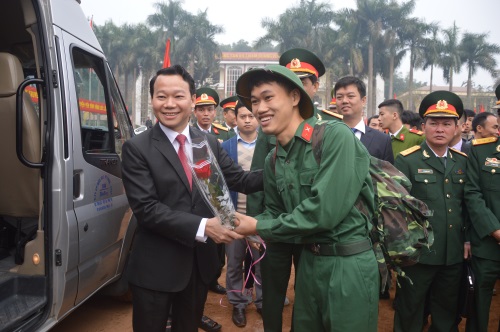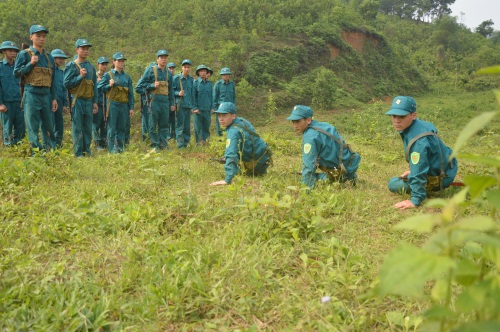Grasping the Party’s line on Homeland protection, over the past years, Yen Bai has always paid due attention to making the all-people’s national defence and the province’s defensive zone increasingly strong. To that end, the province has taken proper measures to build strong local armed forces as a key point.
Yen Bai is a Northern midland province holding a position of importance to the Military Region 2 and the country in socio-political, defence and security fields. Perceiving that, over the past years, under the leadership and direction of the Party and the State, the province’s Party Committee, authority, armed forces, and people have endeavoured to foster socioeconomic development, consolidate defence and security, and improve the people’s material and mental life. However, in general, Yen Bai is a poor province with slow socio-economic development and difference in the people’s intellectual level while their life still faces difficulties. It is also confronted with complicated weather and climate, flash floods, and land slides causing heavy losses to the people’s life and property. Hostile forces take advantage of the province’s limitations and difficulties to sabotage and incite the people in a bid to destabilize its political security and social order. The situation mentioned above has directly impacted on the province’s implementation of defence and military work in general and its building of the armed forces in particular.
 |
| Comrade Do Duc Duy sees new recruits of Yen Binh district off |
Fully aware of the Party’s principle for organizing the armed forces and the position and role of the local armed forces in building the defensive zone according to the 10th Politburo’s Resolution 28-NQ/TW, the Provincial Party Committee and People’s Committee have strengthened leadership and direction over this important task. First, the Provincial Party Executive Committee has focused on building and promulgating specialized resolutions on building strong local armed forces politically, ideologically and organizationally. Grounded on the guidelines by the Provincial Party Committee, the Provincial People’s Committee has proactively issued programs/plans to build the armed forces for each force and each area, particularly the key areas. At the same time, it has engaged the whole political system and people in this work, while promoting the core role of military organs at all levels. It is worth noting that in spite of economic difficulties, the province has always allocated fund for the military and defence work, including the fund for the building of local armed forces in accordance with its particularities in each period, such as the Project on “building the militia and self-defence forces in the 2011-2015 period”, the Project on “Strengthening defence and security support in the 2016-2020 period”, the Project on “organizing the military intelligence - recce forces in the 2016-2020”. Preliminary positive results have been yielded and highly appreciated by the Military Region’s High Command.
Grasping and implementing the Directives by the Ministry of National Defence, particularly by the Military Region 2, the province has focused on making the armed forces “organizationally compact, solid” to meet the mission requirements of each force and the area’s particularities. As for the active forces, the province continues to make them “revolutionary, regular, elite, gradually modern” and politically strong as the basis, with priority given to consolidating the organizational structure and providing materiel for the units tasked with combat readiness in the key areas. To do so, due regard has been paid to strengthening cadre staff at all levels, associating the training and cultivation of this staff with the planning, arrangement and use, and the building and consolidation of party committees with the building of key cadres as the key to the building of the active forces. To build the militia and self-defence forces, the province has directed military offices at all levels to base on the Law on the Militia and Self-Defence Forces and the results of the Project on “building the militia and self-defence forces in the 2011-2015 period” to develop plans and give advice to local party committees and authorities, organs and enterprises on seriously taking steps to build the forces. At the same time, it has directed localities to successfully conduct the work of registration, management, selection and admission of citizens to the militia and self-defence forces in a public, democratic, equal fashion. Importance has been attached to building the core militia and self-defence forces, particularly in the key areas in terms of defence and security and the remote, isolated, and ethnic minority areas. To improve the quality and task performance of the militia and self-defence forces, the province has stepped up the building and cultivation of commune-level military command cadres in line with the building of political bases. Since 2010, the province has directed localities to send nearly 400 commune-level military command cadres to study at military schools, colleges and universities. In the time to come, it strives to have 100% of its communes and wards filled with sufficient positions with above 50% of the military cadres as bachelor holders.
 |
| A training course for the militia and self-defence forces |
To overcome difficulties in building the reserve forces due to limited supplementary resources and reservists’ lengthy absence, the province has asked military organs at all levels to cooperate with localities in conducting the work of registration, examination and management of resources, consolidating and stabilizing the organizational structure of reserve units. In recent years, the province has spent billions of VND on holding 6 courses to train reserve officers for 300 cadres, thereby contributing to improving the quality of the reserve forces. In the coming time, the province continues to step up the Project on ‘building the military intelligence - recce forces in the 2016-2020 period” with a focus on building a widespread system of people’s military intelligence, particularly in the key areas to help local party committees and authorities at all levels always be proactive and opportunely deal with sensitive issues, contributing to maintaining political security and social order in the area.
Besides, the province has directed military offices at all levels to step up the work of training and exercise to enhance the level and capability of combat readiness and the combat strength of the armed forces, meeting the requirements of building the defensive zone and protecting the Homeland in the new situation. The Provincial Military Party Committee has concretized the Central Military Commission’s Resolution 765-NQ/QUTW on “enhancing the quality of training in the 2013-2020 period and beyond”, while directing military offices at all levels to renew content and method of training close to mission requirements, structure and materiel of each force in accordance with the area’s reality and the budget’s capacity. Following the province’s direction, units of the provincial armed forces have taken breakthrough measures to improve the quality of training, with a focus on training to enhance the capability of coordination between forces to maintain political security and social order. Units have closely combined training with discipline management, military training with political and traditional education, while associating training with defensive zone operational projects, natural disaster prevention and control, search and rescue training and mass mobilization. Moreover, great importance has been attached to carrying out provincial and district-level defensive zone exercises, commune-level combat exercises and natural disaster prevention and control exercises. It is worth noting that during those exercises, the province directed units to select content and methods relevant to socioeconomic conditions, local defence and military work and function and tasks of each force, department, and sector; to resolutely remove formalism and over-reliance on the military and public security organs. As a result, the overall quality of the provincial armed forces, awareness and leadership, operation capability of party committees and authorities towards the settlement of defence and security situations have been considerably improved.
Making the provincial armed forces politically strong represents a top, consistent element in the defence and military work. Accordingly, Provincial Party Committee and People’s Committee have directed offices, units and localities to step up the work of political, ideological education and defence and security education in order to build cadres and troops’ political stuff, prevent them from falling into “self-evolution” and “self-transformation”, and make them absolutely believe in the Party’s leadership, readily undertake and fulfil the assigned task. As most of cadres and troops of the provincial armed forces are from ethnic minorities with the differences in intellectual level, the province has directed localities and units to renew content and method of education in a “practical, effective” manner, relevant to their function and task and the area’s particularities. At the same time, units have been asked to accelerate the implementation of the 12th Politburo’s Directive 05-CT/TW in line with localities’ patriotic emulation movements to raise cadres and troops’ political consciousness and responsibility. Besides, significance has been attached to consolidating and enhancing the leadership capacity and combativeness of party organizations in military units and offices at all levels, and admitting new party members in the militia and self-defence forces and the reserve forces. Over the past years, the province has built and maintained the operation of 18 commune-level military party cells. Localities, offices and organizations have been active in the work of admitting new party members, particularly in the militia and self-defence forces.
By taking the measures mentioned above synchronously, Yen Bai province has built strong armed forces as the core in implementing local defence and military tasks. The provincial armed forces have successfully performed their function as “army ready for work” in the work of propagation and mass mobilization, while counselling local party committees and authorities to build strong political bases and implement the “Gratitude” movement and “the Army joins hand in building new-type rural area” to help the people eradicate hunger, reduce poverty, and deal with the consequences of natural disasters, deserving to be a loyal, reliable political, combat force of local party committees and authorities and the people.
Do Duc Duy, Deputy Secretary of the Provincial Party Committee
Chairman of the Provincial People’s Committee